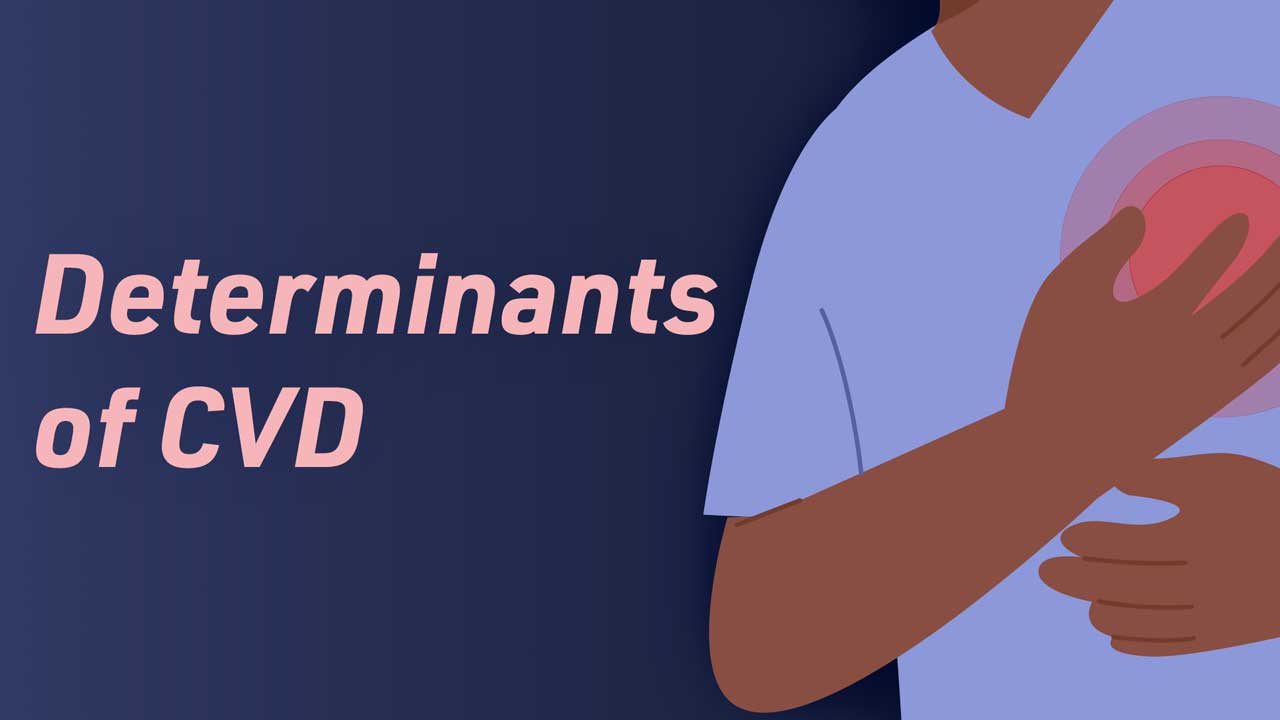Cardiovascular disease (CVD) is one of the 10 major chronic conditions in Australia (ABS 2023).
The other most common chronic diseases are mental and behavioural conditions, back problems, arthritis, asthma, diabetes, osteoporosis, chronic obstructive pulmonary disease (COPD), cancer and kidney disease (ABS 2023).
Unfortunately, at present, chronic diseases affect almost half of the Australian population, with 49.9% of people having at least one chronic condition (ABS 2023).
What is Cardiovascular Disease?
Cardiovascular disease (CVD) is an umbrella term describing disorders of the heart and blood vessels, including:
- Coronary heart disease (alternatively referred to as ischaemic heart disease and includes heart attack/acute myocardial infarction and angina)
- Stroke
- Heart failure
- Rheumatic heart disease
- Congenital heart disease
- Peripheral vascular disease
- Deep vein thrombosis and pulmonary embolism.
(DoHaAC 2021; WHO 2021)

Determinants of a Healthy Cardiovascular System
Determinants of a healthy cardiovascular system include:
- Environment
- Location (e.g. remote, urban)
- Socioeconomic status
- Knowledge (e.g. health literacy)
- Beliefs
- Health behaviours
- Psychology
- Safety
- Genetics
- Biomedical factors.
(AIHW 2016a)
Evidently, not all of these determinants can be changed, but evidence-based interventions aim to reduce risk factors for disease and prevent complications or deaths from chronic disease (Kumar 2017).
CVD is the leading cause of death on a global scale (WHO 2021). Kumar (2017) states that better access to healthcare could help to prevent CVD.
Determinants of Cardiovascular Disease
Determinants of CVD (with stronger evidence links) generally fall under one of the following:
- Behaviours - including tobacco smoking, lack of physical activity and diet (i.e. high intake of saturated fat is linked to coronary heart disease)
- Biomedical - including obesity, hypertension and abnormal blood lipids.
(AIHW 2016a)
Determinants may include:
- Excessive alcohol intake
- Older age
- Ethnicity
- Gender
- Being an Aboriginal or Torres Strait Islander person
- Diabetes
- Smoking
- Diet
- High cholesterol
- Hypertension
- Physical activity
- Weight
- Depression
- Social isolation.
(Better Health Channel 2022)
General Interventions for Determinants of Cardiovascular Disease
Interventions for addressing CVD determinants include:
- Improved policies
- Lifestyle behaviour modification programs
- Improved access to programs and healthcare
- Allocating resources to CVD prevention and management
- Improving the environment
- CVD-specific interventions with effective monitoring and planning systems
- Promoting CVD education across the community (e.g. not just in medical clinics) and targeting CVD risk factors.
(Kumar 2017)
Australia-specific Interventions for CVD
- Subsidised healthcare by the Medicare Benefits Schedule (MBS)
- Subsidised medicines used to treat CVD under the Pharmaceutical Benefits Scheme
- Research into CVD funded by the Medical Research Future Fund and the National Health and Medical Research Council
- The Australian Institute of Health and Welfare's National Centre for Monitoring Chronic Conditions.
(DoH 2021)
Test Your Knowledge
Question 1 of 3
Approximately what percentage of the Australian population is currently affected by at least one chronic condition?
Topics
References
- Australian Bureau of Statistics 2023, Health Conditions Prevalence, Australian Government, viewed 12 September 2024, https://www.abs.gov.au/statistics/health/health-conditions-and-risks/health-conditions-prevalence/latest-release
- Australian Institute of Health and Welfare 2016b, Behavioural and Biomedical Risk Factors, Australian Government, viewed 12 September 2024, https://www.aihw.gov.au/reports/chronic-disease/evidence-for-chronic-disease-risk-factors/behavioural-and-biomedical-risk-factors
- Australian Institute of Health and Welfare 2016a, Evidence for Chronic Disease Risk Factors: Summary, Australian Government, viewed 12 September 2024, https://www.aihw.gov.au/reports/chronic-disease/evidence-for-chronic-disease-risk-factors/summary
- Better Health Channel 2022, Heart Disease - Know Your Risk, Victoria State Government, viewed 12 September 2024, https://www.betterhealth.vic.gov.au/health/conditionsandtreatments/heart-disease-risk-factors
- Department of Health and Aged Care 2021, What We’re Doing About Cardiovascular Conditions, Australian Government, viewed 12 September 2024, https://www.health.gov.au/topics/chronic-conditions/what-were-doing-about-chronic-conditions/what-were-doing-about-cardiovascular-conditions
- Kumar, S 2017, ‘Cardiovascular Disease and its Determinants: Public Health Issue’, Journal of Clinical Medicine and Therapeutics, vol. 2, no. 1, viewed 12 September 2024, https://www.researchgate.net/publication/312092952_Cardiovascular_Disease_and_Its_Determinants_Public_Health_Issue
- World Health Organisation 2021, Cardiovascular Diseases (CVDs), WHO, viewed 12 September 2024, https://www.who.int/news-room/fact-sheets/detail/cardiovascular-diseases-(cvds)
 New
New 
